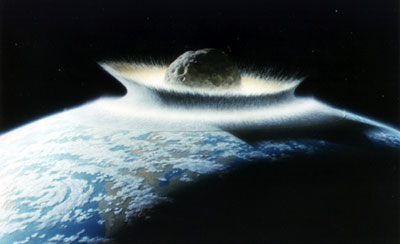The new politics of planetary defenseby Taylor Dinerman
|
| The threat of a catastrophic celestial hit against planet Earth carries little political weight, due to a lack of media interest and the fact that the problem does not fit into any of the normal government structures. |
As a planning tool this matrix had its uses, but it lacked the ability to give political weight to the various threats. From the point of view of the US president and his administration, a low-level hostage seizure may or may not be a major event, depending on who the hostage is and how media-savvy the terrorists involved are. In contrast, the threat of a catastrophic celestial hit against planet Earth carries far less political weight, due to a lack of media interest and the fact that the problem does not fit into any of the normal government structures.
While the US Air Force has taken some preliminary steps towards developing a set of ideas for dealing with this threat, there is no urgency coming from senior leaders in the executive branch. This is not surprising, as their time is limited and they have no real motivation to spend their resources dealing with a threat that may not materialize within the next thirty or forty years.
According to the new Undersecretary of Defense for Policy, Michèle Flournoy, the new focus will be in the “global commons”—the oceans, cyberspace, and space—as well as a new class of “hybrid” threats that Defense Secretary Robert Gates identified last year. Unlike the matrix used previously, which had room for unlikely but possibly catastrophic events such as an asteroid strike, the new administration’s view seems to be focused on nearer-term problems. There is nothing wrong with setting priorities, but to exclude what could be the single most catastrophic event in human history from any senior level US government consideration is probably not a good idea.
What seems to be missing in the global commons concept is the idea that the Earth is, in practical terms, the ultimate place that all of humanity shares. What Flournoy wants is to focus on “sustaining a healthy international system, the maintenance of which is not only central to our national interests but is also a global public good—something everyone can consume without diminishing its availability to others” Certainly being able to go about one’s business without getting smacked by a civilization-ending asteroid should count as a global good.
While the US is obviously going to have to take the lead in any effort to detect and possibly deflect any celestial object that might do our planet harm, it will have to consult with others, both to keep other nations informed and to help make the choices needed to deal with the threat. Yet in the end, it is likely that the decision, if there is one, will rest with the President of the United States. He or she is the only world leader today with the wherewithal to deal with such a threat.
| If the US is have any claim to global leadership in the 21st century it will have to unambiguously take the lead in planetary defense. |
This is why any planning effort that leans to heavily on international institutions may endanger the whole planet. The process inside an organization like the UN would simply get bogged down in procedural and political questions. US leaders may find that the system would be paralyzed while, for example, nations argued over deflection or destructions methods or who would control and pay for them. Precious time would be lost while nations would consider their own best interests in supporting one approach or another.
If the US is have any claim to global leadership in the 21st century it will have to unambiguously take the lead in planetary defense. It should do so in an open way and be ready to listen to everyone’s concerns and ideas. But if the Earth is to be effectively protected, the ultimate decisions will have to be American. In this case “global governance” could end up setting the stage for a disaster.
